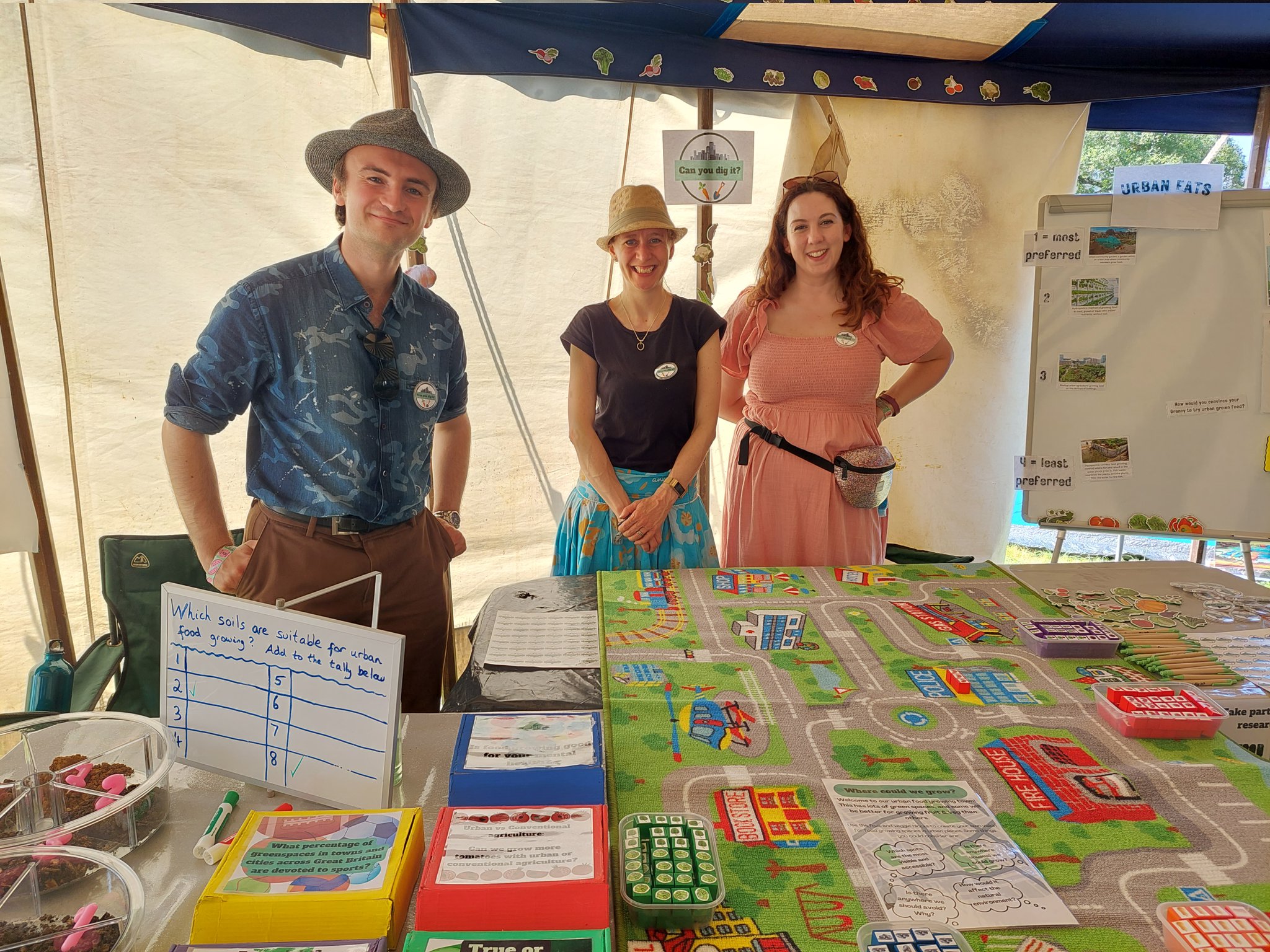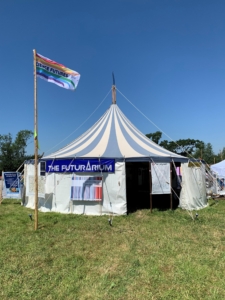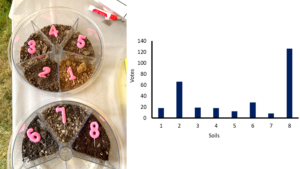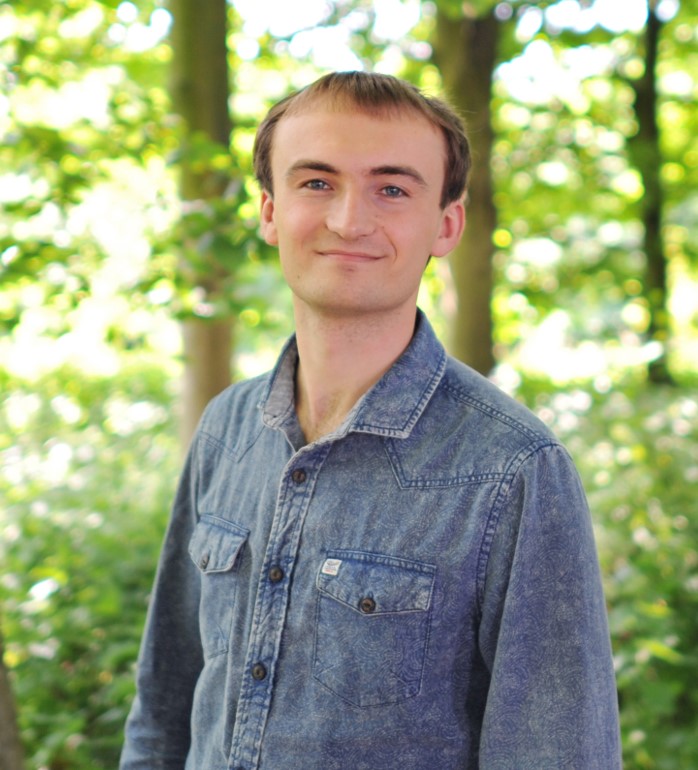‘Can You Dig It?’ at Glastonbury 2022
05/07/2022

From peas in the playing fields to celery from the cemetery – our towns and cities have lots of spaces which we could use to grow food. But what would urban farming do for our health? Could it really help put food on the table? What would it do to our environment?
Rurban Revolution, a two-year Global Food Security programme-funded project has just officially concluded with a residency at Glastonbury 2022. Celebrating the diverse science needed to understand how we can more fairly and sustainably meet our food needs, the Rurban Revolution team created a public engagement space at the popular festival designed to share knowledge about urban food growing through a range of interactive activities. We caught up with Dr Dan Evans of the Cranfield Soil and Agrifood Institute on their return.
Why Glastonbury?

We received an invitation from the Glastonbury Science Futures team. This is a brand-new area within the established ‘Green Futures’ field at the Festival, where festival goers can take a breather from the music, and explore how science shapes our daily lives.
A music festival is, perhaps, an odd choice of location for scientists to talk about and demonstrate their research. I confess to musing on this point too, when I was standing there at the beginning of the week, in a relatively nondescript corner of an under-facilitated field, beside a marquee emblazoned with the words ‘Glastonbury Futurarium’. Very few facets, if any, of a scientist’s daily environment were able to accompany us to the Festival. Stripped bare of the white coats; sterilised work surfaces; ultramodern machines; nests of wires; and all the other bells and whistles that our daily workspaces often entail, we were solely provided a couple of tables, and whatever we could pack into a couple of camping bags.
Our tickets may have been labelled ‘Artists and Performers’, but it was initially difficult to conceive of us performing anything substantive in such a divested space. Of course, I came to realise – as I think all Futurarium ‘performers’ did – that you don’t need flashing neon lights, high-pitched beeps or complex, capacious machines to inspire people about the wonders of science, or to inform them about the findings of your research. All you need is an approachable demeanour, a well-rehearsed and engaging storyboard of your research, and a passion to share your enthusiasm with as many people as possible. Deliver this, and you’ll be richly reimbursed with openminded questions, unfailing curiosity, and a hunger to find out more. I quickly learnt that a music festival represents one of the most effective venues for knowledge exchange. After all, what is a music festival if not a melting pot for ideas, for creative thinking, and for engaging with new perspectives and dimensions?
How did people engage with the stall?
We had a number of activities on offer:

- Urban soils – we exhibited eight soils extracted from within 1 sq. mile of each other in a UK city. We asked visitors to the stand to vote for which soil(s) they considered as most suitable for urban food growing. Although we didn’t initially tell them the precise provenance of the soils, they were all visibly different in colour and texture.
- Planting Fruit and Veg on our Rurban Town – our research has shown that if we used all the green spaces in our UK towns and cities, we could increase domestic food production by eight times. However, we might not want to use all our green spaces, as that would involve us digging up areas such as parks and cemeteries. Instead, we should think strategically about where we plant in urban spaces in the future. We brought along our ‘Rurban Town’ – a table-top mat depicting a town with typical features such as a school, a hospital, a hotel, a railway station, a car park, some green space, an urban farm, and so on. We asked visitors to the stand to explore the map and identify where they would grow fruit and vegetables in the future, placing little wooden fruit/veg counters in the locations of their choosing. At the end of the each day, the map was covered in multi-coloured counters. Some had selected more traditional locations, such as green space and parks, while others had opted to grow fruit and vegetables on the rooftops of buildings, on car parks, and even on the roundabout!
- Ecosystem Services ‘Top Trump’ cards – some of our recent research has demonstrated that urban agriculture doesn’t just have the capacity to put food on a plate; it can deliver a wider range of benefits and functions for both people and planet, too! We call these ‘ecosystem services’ and these can include benefits such as supporting pollination, maintaining air quality, sequestering carbon into the soil, maintaining genetic diversity, supporting mental and physical health, and so on. Visitors to the stand were able to engage with some of these through playing the famous ‘Top Trumps’ game. Eight urban food growing spaces were scored in terms of their ability to deliver nine ecosystem services, and for each space, players had to select the service they thought was best-served. If their card’s score for that service was greater than their partner’s, they won their partner’s card!
- Live study: We also ran a live study at the stand too in which visitors learned about different methods of urban food growing, from more traditional activities such as growing food in gardens, through to high-tech hydroponics and aquaponics. Throughout the week, we captured opinions about foods grown via these different methods. The data will contribute to our ongoing research on consumer perceptions of urban-grown food.
What’s next for Rurban Revolution?
Rurban Revolution has officially concluded, however, many members of the team have follow-up projects. Cranfield University is currently leading a couple of STFC-funded projects which are exploring the potential of vacant and under-utilised spaces for food growing. One of these is based in Newcastle, where we plan to make use of the city’s Urban Observatory network of sensors to help us measure some of the environmental conditions of different vacant spaces in and around the city. We are also working with the London Borough of Islington and the Borough-wide food growing ‘Octopus Communities’ on a project called Urban Cultivate, which seeks to identify a cluster of under-utilised spaces for a wide range of food growing supply chain functions, including food waste collection, soil formation, seedling development, cultivation, food vending, and knowledge exchange.
Categories & Tags:
Leave a comment on this post:
You might also like…
Keren Tuv: My Cranfield experience studying Renewable Energy
Hello, my name is Keren, I am from London, UK, and I am studying Renewable Energy MSc. My journey to discovering Cranfield University began when I first decided to return to academia to pursue ...
3D Metal Manufacturing in space: A look into the future
David Rico Sierra, Research Fellow in Additive Manufacturing, was recently involved in an exciting project to manufacture parts using 3D printers in space. Here he reflects on his time working with Airbus in Toulouse… ...
A Legacy of Courage: From India to Britain, Three Generations Find Their Home
My story begins with my grandfather, who plucked up the courage to travel aboard at the age of 22 and start a new life in the UK. I don’t think he would have thought that ...
Cranfield to JLR: mastering mechatronics for a dream career
My name is Jerin Tom, and in 2023 I graduated from Cranfield with an MSc in Automotive Mechatronics. Originally from India, I've always been fascinated by the world of automobiles. Why Cranfield and the ...
Bringing the vision of advanced air mobility closer to reality
Experts at Cranfield University led by Professor Antonios Tsourdos, Head of the Autonomous and Cyber-Physical Systems Centre, are part of the Air Mobility Ecosystem Consortium (AMEC), which aims to demonstrate the commercial and operational ...
Using grey literature in your research: A short guide
As you research and write your thesis, you might come across, or be looking for, ‘grey literature’. This is quite simply material that is either unpublished, or published but not in a commercial form. Types ...







